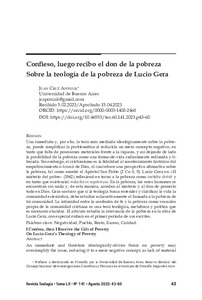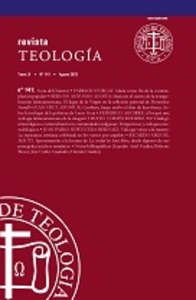Please use this identifier to cite or link to this item:
https://repositorio.uca.edu.ar/handle/123456789/17233| Título: | Confieso, luego recibo el don de la pobreza : sobre la teología de la pobreza de Lucio Gera I confess, then i receive the gift of poverty : on Lucio Gera’s theology of poverty |
Autor: | Aponiuk, Juan Cruz | Palabras clave: | POBREZA; Gera, Lucio, 1924-2012; PUEBLO; CARIDAD | Fecha de publicación: | 2023 | Editorial: | Pontificia Universidad Católica Argentina. Facultad de Teología | Cita: | Aponiuk, J. C. Confieso, luego recibo el don de la pobreza : sobre la teología de la pobreza de Lucio Gera [en línea]. Teología. 2023, 60 (141). doi: 10.46553/teo.60.141.2023.p43-60. Disponible en: https://repositorio.uca.edu.ar/handle/123456789/17233 | Resumen: | Resumen: Una inmediata y, por ello, la tesis más mediada ideológicamente sobre la pobreza,
puede simplificar la problemática al reducirla un mero concepto negativo, en
tanto que falta de posesiones materiales frente a la riqueza, y así dejando de lado
la posibilidad de la pobreza como una forma-de-vida radicalmente redimida y liberada.
Sin embargo, el cristianismo es la fidelidad al acontecimiento histórico del
empobrecimiento o kenosis de Dios, el cual ofrece una perspectiva afirmativa sobre
la pobreza, tal como enseñó el Apóstol San Pablo (2 Co 8, 9). Lucio Gera en «El
misterio del pobre» (1962) reflexionó en torno a la pobreza como imitatio christi y
en tanto que existencial reductio in mysterium. En la pobreza, los seres humanos se
encuentran sin nada y, de esta manera, acceden al misterio y al don de poseerlo
todo en Dios. Gera sostuvo que si la teología busca entender y clarificar la vida la
comunidad eclesiástica, debe estudiar exhaustivamente el llamado a la pobreza de
tal comunidad. La intimidad entre la confesión de fe y la pobreza como vocación
propia de la comunidad cristiana es una tesis teológica, metafísica y política que
es necesario elucidar. El articulo estudia la relevancia de la pobreza en la obra de
Lucio Gera, con especial énfasis en el primer período de sus escritos. Abstract: An immediate and therefore ideologically-driven thesis on poverty may oversimplify the issue, reducing it to a mere negative concept, as lack of material possessions compared to wealth, thus neglecting the possibility of poverty as a radically redeemed and freed form-of-life. However, Christian faith embraces the historical event of God’s self-impoverishment or kenosis, which offers a positive perspective on poverty, as seen in the Apostle St. Paul’s teachings (2 Co 8, 9). Lucio Gera’s «The Poor’s Mystery» (1962) reflects on poverty as imitatio christi and as an existential reductio in mysterium. In poverty, humans are stripped of everything and in this way they access to the mystery and gift of finding possession of all things in God. Gera argues that if theology seeks to understand and clarify the life of the ecclesiastical community, it must fully appreciate the call to impoverishment that this community faces. The confession of faith and poverty as a vocation of the Christian community are intimately linked and require theological, metaphysical, and political analysis. The article studies the relevance of poverty in the work of Lucio Gera, with special emphasis on the first period of his writings. |
URI: | https://repositorio.uca.edu.ar/handle/123456789/17233 | ISSN: | 0328-1396 (impreso) 2683-7307 (online) |
Disciplina: | TEOLOGIA | DOI: | 10.46553/teo.60.141.2023.p43-60 | Derechos: | Acceso abierto | Fuente: | Teología. 2023, 60 (141) |
| Appears in Collections: | TEO - 2023 Tomo LX nro. 141 |
Files in This Item:
| File | Description | Size | Format | |
|---|---|---|---|---|
| confieso-luego-recibo-don.pdf | 317,43 kB | Adobe PDF |  View/Open | |
| teología-141-portada.jpg | 11,06 kB | JPEG |  View/Open |
Page view(s)
67
checked on Apr 27, 2024
Download(s)
45
checked on Apr 27, 2024
Google ScholarTM
Check
Altmetric
Altmetric
This item is licensed under a Creative Commons License

